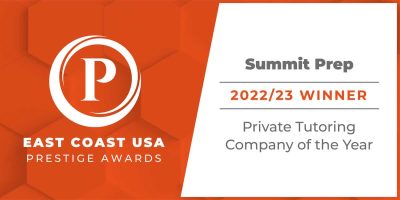
Also, an important note: the SAT and ACT are not perfect. We all know that. They do not capture the potential of all students. But, they do provide criteria that is useful for helping to assess most students. As the recent University of California staff report shows, given the rampant grade inflation in high schools, the SAT and ACT are increasingly better predictors of success in college than grades. This opportunity for an objective measure should give students confidence: a student with inflated grades at another school will not take their spot, because — unlike that student — they will have both the grades and the scores from standardized assessments to be able to demonstrate their superior skill and knowledge to colleges.
Here is a transcript of the episode:
Amy Seeley: Welcome, everyone. I’m Amy Seeley, president of Seeley Test Pros, helping students succeed on all kinds of tests, from eighth grade to grad school, in Cleveland, Ohio.
Mike Bergin: And I’m Mike Bergin, president of Chariot Learning, helping students with tests, school and life, based out of Rochester, New York.
Amy Seeley: Between the two of us today, we have over 50 years of experience at the highest levels of the test preparation and supplemental education industries.
Mike Bergin: We both love to talk and learn about the latest issues in education, testing, and college admissions. So let’s get down to Test and the Rest. The fascinating topic we want to explore today is why the SAT and ACT are awesome. But first, let’s meet our special guest, David Blobaum.
Amy Seeley: David Blobaum graduated from the University of Chicago. Since then, he has devoted himself to helping students reach their potential on the SAT and ACT, and more broadly, to help them succeed through education. David founded Summit Prep in 2013 with a former college classmate. Currently, they have two tutoring centers with a team of SAT/ACT experts serving students in New Jersey. David consults with schools on SAT/ACT best practices. He not only teaches students the necessary subject matter, but also motivates them to continually strive towards their potential. Welcome.
David Blobaum: Glad to be here, Amy and Mike.
Mike Bergin: David, we’re really looking forward to talking with you. Before we get into our topic, I want to hear more about your history, how a person studies as many wide ranging areas as you have in your life, and came to love, to truly love the SAT and ACT.
David Blobaum: Sure. Yeah. Good question. So when I started at the University of Chicago, I was positive that I wanted to be a psychologist, a counseling psychologist. And then I took my first class at the University of Chicago in psychology, and decided I did not want to be a counseling psychologist, at least I didn’t want to be a psychology major there.
Mike Bergin: I wish I was as smart as you because it took me the entire time I was at college, and then a couple years after before I figured out I didn’t want to be a psychologist.
Amy Seeley: Although, some would argue we do a lot of counseling with our students. Right, David?
David Blobaum: That’s true. And I mean, that’s one of the great things about privately tutoring in particular, so still get to exercise that. But then I just cast around, took classes in 17 different disciplines. Ended up landing on sociology, again just because of the interest and love of people. Didn’t end up using that though either when I graduated from college. Actually, I got a job offer from the CIA to be a leadership analyst in Kazakhstan. But while I was waiting for that nine to 12 month background check to clear, I started tutoring part-time, and ended up absolutely loving it. So education and really just tutoring really combined my love of people and my love of education and teaching, so I actually then ended up just canceling the background check and just going all in on tutoring.
Amy Seeley: So SAT/ACT is better than CIA.
David Blobaum: (laughter) I’ll go on record saying that, yes.
Amy Seeley: Go on record. (laughter)
Mike Bergin: They’re listening anyway. (laughter) So you never made it to Kazakhstan.
David Blobaum: Nope, nope. Not yet at least.
Mike Bergin: Yeah. I have a friend who’s been there. It’s supposed to be beautiful. So all right, so you started tutoring privately, just kind of informally. You weren’t working for any company at that time. You were doing it on your own.
David Blobaum: Good question. No, I did start tutoring for another company. I mean, it was good. It helped me get my foot in the door. The owner of that company had a brilliant, basically pitch to schools that he would use. And the pitch that he would use to schools is all SAT/ACT prep companies are the same, and we’re the cheapest. And I hated that pitch. It’s brilliant. It worked every time because it really played into people’s distrust of the tests. But I didn’t want to … Nothing against being the cheapest, I didn’t want to necessarily offer the cheapest prep though. I wanted to offer the best prep because I really believe in education, and it’s of the utmost importance, so I wanted to be giving my students the best education possible. So then a few years later, I started up my own tutoring company with a classmate of mine from the University of Chicago. And it’s gone really well. We’ve been able to help a lot of kids so far.
Mike Bergin: All right. So, through this process of teaching for someone else, starting summits, working in this industry for as many years as you have, you’ve come to appreciate the SAT and ACT in a way that many of its critics do not.
David Blobaum: Right. Yeah. So when I look at the SAT and ACT, I try not to look at them in a vacuum, which I think is what a lot of people do. They just focus on the SAT and ACT, and they see it as an obstacle to success. What I try and do is zoom out and look at: Well, what are the SAT and ACT based on? Well, they’re based on what we learn in school. So I first try and say, “Well, is education helpful and beneficial?” And I think we’d all say yes. And I think everyone I’ve ever met would say yes. You never met a family that said, “I don’t want my kid to be educated.”
David Blobaum: So then we have to ask ourselves, “Well, why is education helpful and beneficial?” And that answer will also be about the same answer as why the SAT and ACT are awesome. So there’s looking at: Well, why is education awesome? I mean, if we think about the most important subject, which I think is language in school, language is the foundation of our civilization. We couldn’t have an organized, functioning society if we couldn’t communicate. So also, the better someone gets at their own language, and in the US that’s primarily English, the better able they are to be able to learn history, to learn the sciences, even to learn math because there’s a lot of students from other countries, for instance, when they take the SAT and ACT, they struggle sometimes on the math, not because they’re not great at math, but because they’re struggling on the word problems.
David Blobaum: So English is even important for doing mathematics. And in mathematics for instance, the whole world is built on math. But that’s pretty abstract for most people. If we just think about: Well, for individually each person, why is math important? Take for instance just risk and reward. So let’s say that you drive, you make two trips in your car per day, and you do that every single day. Right? Let’s say that you’re 99.9% safe on every single trip that you make. It turns out that there’s a 52% chance that you’ll be in a car accident in a year. So all those people listening to this while you’re driving, keep your eyes on the road.
Mike Bergin: Wow. I haven’t seen that problem on the tests yet.
David Blobaum: Not yet, not yet. So understanding probability and numbers, you understand that when you do something many, many, many, many times, unlikely events become very likely. So in a 40 year time span, it’s actually .0 and ten zeros, .0 with ten zeros, 2% chance that you won’t be in accident if you’re 99.9% safe. So that’s just mind boggling. But we can’t even hope to understand that unless we sort of, we get a grasp of math. Or for individuals trying to hope for a good retirement, understanding compound interest, compound gains, understanding that in a broadly diversified index fund, your money’s going to double about every 10 years. So in 40 years, your money’s going to go up by 16 times what the initial amount was. So math is not just broadly important for building the world, which it is, but it’s very important for every individual.
David Blobaum: I get really excited about it. And then there’s the sciences, just understanding how life sustains itself, which is biology, or understanding what makes up matter and how it changes under different conditions. That’s chemistry. Or understanding the nature of matter as it moves through time and space, that’s physics. So if you want to be able to understand the world around us and understand how to use the world, we need science. Right? So the content of what we learn in education is unbelievably important. But not only that, the outcomes of education prove how important it is.
Mike Bergin: All right. So David, listen. You don’t need to convince us.
Amy Seeley: You’re preaching to the choir.
Mike Bergin: Reading and math and science are important. But what does that have to do with the SAT and ACT?
David Blobaum: Could I add one more point? I have one more thing on how education’s awesome.
Mike Bergin: Of course.
David Blobaum: All right. So it will relate. If we consider the most educated versus the least educated people, so that’s people with professional degrees versus people who didn’t graduate from high school, those people with professional degrees are earning 400% more. Not 4%. Not 40%. 400% more. For every year of education, you’re getting an 8% raise to your lifetime earnings. You’re also living longer, on average 15% longer. You’re also healthier, psychologically healthier, physically healthier. And all those things add to more happiness. So to your point Mike. How does that relate to the SAT and ACT? Because the SAT and ACT are testing you on the content that you learned in school. So all those things, all that knowledge that’s important for life, for us to be successful, for us to be healthy, for us to be happy, the SAT and ACT, they’re founded on that same content and principles and skills.
Mike Bergin: But the SAT and ACT aren’t subject tests. And so you’re talking about all these different subjects in school. History isn’t tested. Science isn’t tested. What’s so special about the SAT and ACT?
David Blobaum: Awesome question. So it really distills down the core subjects are important. So let’s walk through the ACT for instance. So the first section of the ACT is English section, which tests grammar, which tests students on grammar and tests students on rhetorical skills. So grammar is really the key that unlocks language. Without knowing grammar, you can’t say what you want to say in the way that you want to say it. So let me give you an example. Let’s say you have the sentence: Success was her one driving motivation. Okay, cool. It’s a sentence.
David Blobaum: Let’s say instead you said, “She had one driving motivation: success.” And after motivation, you do a colon before success. Now we’ve just dropped a bomb of emphasis on the word success. And we’ve introduced a pause, which slowed the reader down. Or let’s say you have a sentence. I pushed on the stone with all my strength. Okay, again, it’s a sentence. Let’s say you take that prepositional phrase, with all my strength, and you drop it into the middle of the sentence, and you say, “I, with all my strength, pushed on the stone.” So again, I emphasized it by putting it out of its normal placement by putting commas around it. So not only have I provided emphasis, but I had control over my reader there because I forced the reader to slow down. So if you want the reader to slow down, put in dependent clauses in the middle of your sentence. You want the reader to read more quickly, you just subject, verb, subject verb, and they’ll read more quickly. So you can be more compelling. You can say what you want to say. You have control over that reader the more grammar you know. And that’s what the ACT is testing. Same thing with the SAT.
David Blobaum: And then there’s rhetorical skills of: How do I structure an essay to be more convincing? How do I structure a paragraph to be more convincing? The SAT is testing sentence placement. It’s testing. What should I include to be relevant on this topic and persuasive? So the ACT English section is really an amazing test of proficiency on skills that students are going to need for the rest of their lives.
Amy Seeley: So what you’re really saying is how the test is sort of ensuring that students can elevate their skill level by understanding sort of these different constructs. So it’s not about, like you said, if you have a subject verb sentence, simple, easy, but at the same time, may lack sort of more clarity that you can gain with sort of this technical knowledge.
David Blobaum: Absolutely. Yes. It’s not hypothetical. So they’re not testing students on mistakes and grammar topics that students don’t encounter. So I worked with a student only three hours before this last December ACT. And afterwards, she sent me her college essay just for a second set of eyes. This was going to be the essay that she was going to submit. And unfortunately, I only had three hours with her, and she was making the … I mean, you could’ve made an ACT English section out of her essay.
Amy Seeley: That is so true. When you get to see samples of your students’ writing, it’s like they’ve carried over all the grammar. So we could say the SAT and ACT can predict the grammatical issues students are going to have, and that’s what they’re testing.
David Blobaum: Exactly. Yeah. She was starting dependent clauses with a comma, but not ending them with a comma. Verb tense. It was the ACT English section.
Mike Bergin: So noun, pronoun ambiguity, that is really in student writing. Right?
Amy Seeley: Absolutely.
Mike Bergin: All of those isolated ambiguous “its” floating around.
David Blobaum: Exactly.
Mike Bergin: Tenses, punctuation, the works.
Amy Seeley: You name it.
Mike Bergin: It’s all there. So right, so clearly the English sections of the SAT and ACT cover something that colleges care deeply about, that they want to make sure that students are arriving able to write effective sentences. And the SAT and ACT grammar sections may be the only way to ensure that A) they know where students fall in that regard, and B) students may take the time to brush up on that grammar before they take the next step.
David Blobaum: Right.
Mike Bergin: What about reading? Everybody knows how to read.
David Blobaum: Yeah. And also, Mike, just to add on, to me it’s also not just about college, but about success in life.
Mike Bergin: Good point.
David Blobaum: I mean, we’re going to be communicating for the rest of our lives. I don’t know how many emails you guys send a day. For me, it’s a lot. The better able I am to communicate, that’s relationships, that’s business. You need it for both. But yeah, so to your point. The reading section, for instance, the reading section, it’s a test. And we need to test proficiency in reading, and that’s really what it does. It’s quite straightforward. You have to read it pretty quickly. But it is testing that very valuable skill of testing. Do you understand what you just read? Right? And what I think is missed as well is if colleges didn’t look at the SAT and ACT, I would hope that all students would still take them. Right? That sounds crazy, but-
Amy Seeley: Good luck with that. (laughter)
David Blobaum: (laughter) Exactly, exactly. But let me give you why. Because as we all know, grade inflation is so rampant. Right? So with the average student and a good school, having an A minus, kid’s can’t … They don’t have an accurate measure of how they measure up. Well, now we’re in a national and international job market. You’re going to really want to know where you measure up once you enter that workforce. And what’s all this education for? Right? I mean, it’s to be successful in life, as well as everything else that comes with education.
David Blobaum: So I, as a student, would want some objective feedback of: Hey, how do I compare to people nationally? Well, if I didn’t get that my … I take an ACT, and my reading section score is a 15, that’s a really, it should be a really good wake up call that I need to read more and I need to work more. The SAT and the ACT, they aren’t just testing our proficiency, they can also be a really good wake up call to work harder on these areas of weakness. And if students that those seriously and work on those areas of weakness, they’re going to do better in college and for the rest of their lives.
Mike Bergin: None of this can be disputed, or at least not among this group. We all hold … So you make really strong cases for why everyone needs real strength in grammar, writing, and reading, 100%. It’s hard to find an area where you’re not going to need that in college and in life. But what about math? A lot of people are not on a math track, and they know that sometimes they’re learning these math concepts for the very last time. They’ve learned them in life. They’ve forgotten them. They have to learn them again for the SAT and ACT. But they’re not going to need them later. How is that defensible?
David Blobaum: Yeah, great question as well. I had the exact same feeling when I was in school. Right? What I’ve learned in … Hindsight’s 20/20. What I’ve now learned is that learning math topics, even if I might never use the math topic itself again, that learning that math topic still increased by mathematical ability and my mathematical reasoning ability, and that is so key for life. So I meet with people to … I also have a love of personal finance, so I meet with people to talk about their personal finances. And it’s really a barrier to overcome, just to explain the math behind retirement. It’s not really hard math.
Mike Bergin: Like compound interest.
David Blobaum: Compound, yeah, compound interest, or credit scores and interest rates. It’s not that hard, and if people, honestly, if people had done better on their standardized tests, these concepts would be more accessible to them. But not only that, some of the concepts that are tested are of paramount importance, so averages, percentages, those are tested on every single ACT. And you should know those for life as well.
Amy Seeley: That’s right. With some of those math questions, they’re very situational. There are situations that as an adult, you can relate to and say … I mean, something as simple as I’m going to pay a tax, or I’m going to give a tip, or I’m going to hopefully get a discount. Or even interest, right? So it is interesting that many of those word problems, story problems, are situations that every adult at some point in time should be finding themselves in. Right?
David Blobaum: Exactly. Exactly. Yeah. And to your point, Amy, as well, there’s so many questions on money. Right? So taxes and percentages, with money that we’re going to be working with those the rest of our lives.
Mike Bergin: Yeah. More and more, the test makers are pushing into those topics.
David Blobaum: Yes.
Amy Seeley: And shockingly, students don’t get it. I mean, that’s the sad reality, I think what we observe firsthand is these are basic concepts for life. And yet, students seem to have very little understanding, meaning they add a discount when they’re supposed to subtract, or they subtract the tip when they … And it sounds silly, but those are the kinds of things kids do.
David Blobaum: Absolutely. Yeah. And then I think when you pair the math and the science together on the ACT, I think that’s really what’s most important, and where the world is headed. So we’re in an information technology age. And the science section, I don’t even think it should be named science. I think it should be called data interpretation and scientific reasoning. Right? And so more and more, we’re moving into having just massive amounts of information and being … And we have to be able to understand that information. Well, how do we really understand it? We understand it with numbers and with graphs and tables. Numbers, that’s the math section. Graphs and tables, that’s the science section.
David Blobaum: So they’re really testing key skills of being able to interpret data from a graph and table and assess. Well, what assumptions am I making? And what are the logical conclusions I can make from this data? So you pair those two sections together, and those are more and more important for being successful in today’s world, I think.
Mike Bergin: I agree with you. You’re making really great points about why they’re awesome. Now you’re preaching to the choir when it comes to me and Amy. But if you could make one more point for some people who might still be skeptical, why are the SAT and ACT awesome?
David Blobaum: Sure. So to that, I would point towards it’s not me saying it. It’s not Mike and Amy saying it. It’s really the data that backs it up that they’re awesome. So for instance, just seven days ago on February 3rd, the University of California came out with a massive, over 200 page report on the SAT and ACT in admissions, in their admissions. And they said that the SAT and ACT are more predictive of success in college than even high school grades. And they pointed to the fact that there is so much grade inflation now that we really need those standard objective measures. And they really do predict success.
David Blobaum: So for all those reasons that the content is awesome, it can be a wake up call for the student to actually learn that content. It does predict success in college and beyond. I mean, for me that’s everything we need to say that these tests are great, just like education’s great.
Mike Bergin: Are you convinced, Amy?
Amy Seeley: Yeah. I’m all in.
Mike Bergin: Well, listen. I know we could talk about why the SAT and ACT are awesome all day. Unfortunately, we are out of time. Thank you so much, David, for joining us today.
David Blobaum: It was my pleasure.
Mike Bergin: If listeners want to get in touch with you, what’s the best way for them to do that?
David Blobaum: Best way is to visit us on our website at summitprep.com, or check us out our blog, which is summitprep.com/blog.
Amy Seeley: Awesome. We hope you enjoyed this discussion as much as we did. Be sure to join us for another fascinating topic and guest on the next Test and the Rest.
Mike Bergin: Did you enjoy this episode as much as we did? Find expanded links and more for this and all of our episodes at our show page at testandtherest.com. While you’re there, be sure to explore everything the larger TestBright site has to offer, including real expert, unbiased answers to the toughest admissions testing questions. Of course, we love for you to rate, review, and subscribe to Test and the Rest on your favorite podcast platform. If there’s a topic or guest you’d like us to feature, just let us know and spread the word.








